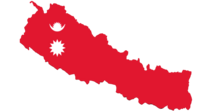|
Jagat Prakasha Malla
Jagat Prakasha Malla (Nepal Bhasa: 𑐖𑐐𑐟𑐥𑑂𑐬𑐎𑐵𑐱 𑐩𑐮𑑂𑐮) was a Malla Dynasty King of Bhaktapur, Nepal from 1642 to 1673.[4] He succeeded his father Naresha Malla when he was just four years old and was under the regency of his aunt Annapurna Lakshmi and his mother Kamala Devi until his Diksha ceremony in 1654.[5] He is also known as Jagaccanda (Nepal Bhasa: 𑐖𑐐𑐔𑑂𑐔𑐣𑑂𑐡), a syncretic name formed by combining his name with his minister Chandrasekhar Simha.[6] From around 1659 till Chandrasekhar's death in 1661, Jagaccanda appeared in books, inscriptions and manuscripts in place of the monarch's name.[7] Throughout his life, he wrote plays and poems in both Nepal Bhasa and Maithili. His poetry book, Nepal Bhasaya gita ("songs in Nepal Bhasa") which contains 518 different poems, is considered by some experts to be one of the most important works in Nepal Bhasa.[4][8] He died of smallpox when he was 35 years old.[5] Marriage and ChildrenAs per his Maithili drama Prabhāvatīharana-nātaka and his son Jitamitra Malla's inscriptions, his first two wives were Padmavati and Chandravati, the former of whom was the queen consort and the mother to the heir.[9] His third and favourite wife Annapurna was, according to Vaidya, a maiden from Panauti.[10] But Dhaubhadel, based on one of his stone inscriptions which mentions Chandrasekhar performing the Kanyadana of Annapurna, theorizes that Annapurna was likely the sister of Chandrasekhara.[5] As depicted in a Paubha from 1670, Jagata Prakasha had four children, three sons and a daughter.[6] His sons were:
And his daughter was:
According to a contemporary expenditure book, Nandini's wedding ceremony took place at sadasiva chuka, a courtyard of the royal palace in 1674 (NS 795).[11] While the expenditure book contains the details of the rituals performed and the expenditure incurred in the wedding ceremony, it doesn't mention the name of her groom.[11] Maithiili dramasJagat Prakasha Malla is known to have written ten dramas, of which two have been published in the Maithili language. These are:[12]
Gallery
ReferencesBibliography
Citations
|
||||||||||||||||||||||||||||||||||||||||||


![A wooden sculpture depicting Jaggacanda, the syncretic form of Jagata Praksha Malla and his favourite minister, Chandrasekhara Simha[13]](http://upload.wikimedia.org/wikipedia/commons/thumb/8/84/Wooden_sculpture_of_Jaggachnadra_at_the_National_Museum.jpg/118px-Wooden_sculpture_of_Jaggachnadra_at_the_National_Museum.jpg)



